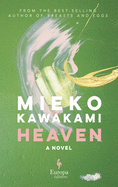
"Brutal" doesn't convey enough of the utter horror of Mieko Kawakami's sophomore import, Heaven. Translated from the Japanese by Sam Bett and David Boyd, who enabled the stupendous success of Kawakami's English debut novel, Breasts and Eggs, Heaven further confirms Kawakami's superb literary ability to expose and disturb.
A folded note tucked into a pencil case inaugurates an unlikely friendship between two middle-graders who have little in common beyond the relentless bullying both endure at school: "We should be friends," Kojima writes to her classmate, dismissively labeled "Eyes" by his tormentors for wearing glasses due to his amblyopia. The girls target Kojima for her unkempt presentation, but their attacks on her are comparatively milder than the outright assaults the 14-year-old narrator survives--the bullies' initial caution not to leave visible marks devolves into covering him with a split-open volleyball and viciously using his head for soccer. The abused pair maintain an in-school silence, but outside--via handwritten notes, occasional meetings, a summer museum daytrip--their relationship provides lifesaving respite. Their innocent, desperate bond delivers "happamine... it's, like, dopamine that comes out when you're really happy." But the threat of "unhappamine" is inevitable.
Kawakami is unblinking in her graphic depictions of what the children suffer--the punishments made more abhorrent with the understanding that the perpetrators, too, are children. The absence of adult oversight is also profoundly jarring. Even more remarkable is Kawakami's ability to move from such abject terror to the private, separate heaven to which the bullied pair occasionally escape. Despite the suffocatingly looming violence, the duo's intense, forced-to-be-mature inner lives will keep readers mesmerized to the final page. --Terry Hong, Smithsonian BookDragon

